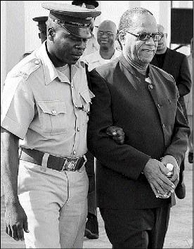Jamaicans played key role in Coard's defence
Published: Wednesday | September 16, 2009

Bernard Coard under close watch from police personnel.
The year was 1979. What the English-speaking Caribbean was about to experience was unprecedented. People had only heard of things like this happening perhaps in Africa and Latin America.
An ouster did come close to home once. But even when it happened in Cuba nearly three decades earlier, no one ever imagined that the English-speaking Caribbean would eventually have her own coup and brief marriage to Marxist-socialism and, least of all, on the island of Grenada.
Brief it was indeed. Four years in matrimony and split ideologies would cause irreconcilable differences.
Maurice Bishop, the leader of the Marxist New Jewel Movement, (NJM) which overthrew the then prime minister, Eric Gairy, and his Grenada United Labour Party just four years earlier, was about to face his own usurpation by his second-in-command and deputy prime minister, Bernard Coard.
Power-sharing agreement
In October 1983, after refusing to accept a power-sharing agreement with Coard, Bishop was deposed and placed under house arrest along with some of his Cabinet supporters. Public protests followed and, during one of the demonstrations, he was let loose from his house arrest by the crowd.
Bishop and his Cabinet members were eventually captured and executed by members of the People's Revolutionary Army (PRA) his own People's Rev-olutionary Govern-ment (PRG) had created - just hours after he had been freed.
Although it was a period which might have scarred the face of the Grenadian nation, it heightened the platform of some of Jamaica's most prominent attorneys today, like A.J. Nicholson, Jacqueline Sam-uels-Brown, Ian Ramsay, Earl Witter, Glen Cruickshank, Zach Harrison and Howard Hamilton. They were all members of the team of lawyers here who flew to Grenada to defend Coard, who had been arrested and charged for the murder of the prime minister and members of his Cabinet.
"How we came into the matter is that Mr Ramsay was contacted by the brother of Bernard Coard, after he had been detained and arrested, to take over the case of his brother and the rest of the former members of government who were now in custody," Hamilton recalled.
But even before they received that call, lawyers like Samuels-Brown and Maurice Frankson were already on the ground representing some of those who had been detained.
"She (Samuels-Brown) had to face the might of the US military and that's where she showed her true mettle because from the very outset she was met with obstacles and blockades but, like a real little terrier, she was undaunted and she never stopped until she was able to vindicate and exercise the right of her clients," Hamilton reminisced.
Hamilton was the man responsible for selecting the team of attorneys. He remembers the early days of the trial as tough.
"We were met with a lot of hostility from the people because the popularity of Mr Bishop was renowned," he told The Gleaner.
It's been a long case - lasting for nearly 26 years - but it has ended with Coard being finally freed following a judgment from the Privy Council to have him resentenced in 2007. On June 17 that year, he was sentenced to 30 years in prison, which included the time he had already spent.
He was freed from the Richmond Hill Prison just over a week ago after the governor general accepted advice to remit the remainder of his sentence. The 65-year-old has expressed an intention to join his ailing wife, Phyllis, in Jamaica.
In spite of his incarceration, Coard was able to make contributions, using education as his medium, Hamilton said. The former university lecturer taught others while in prison and some 450 of the inmates as well as members of the former PRG have managed to improve their academic status, ranging from Caribbean Secondary Education Certificate certification to graduate degrees.
Recidivism rate



( L - R ) Nicholson, Samuels-Brown, Hamilton
"Interestingly, of all the inmates that he taught, the rate of recidivism was 23 per cent, as those who did not attend classes was 90 per cent," Hamilton underscored.
Coard himself declined an opportunity to escape from prison when in 2004 Hurricane Ivan severely damaged the Richmond Hill prison.
But Coard's case has also helped to propel to eminence a number of those attorneys who represented him. Nicholson, Witter, Norma Linton, Cruickshank and Harrison have all since been bestowed with the title Queen's Counsel. Nicholson himself became attorney general and justice minister under the People's National Party.
"I wasn't being prophetic at the time but all of them have achieved eminence in their own right," Hamilton said.







